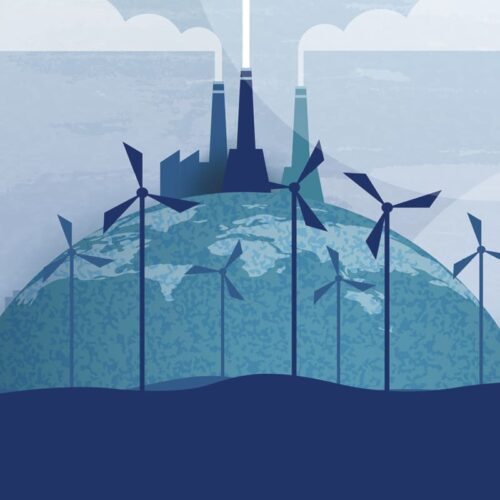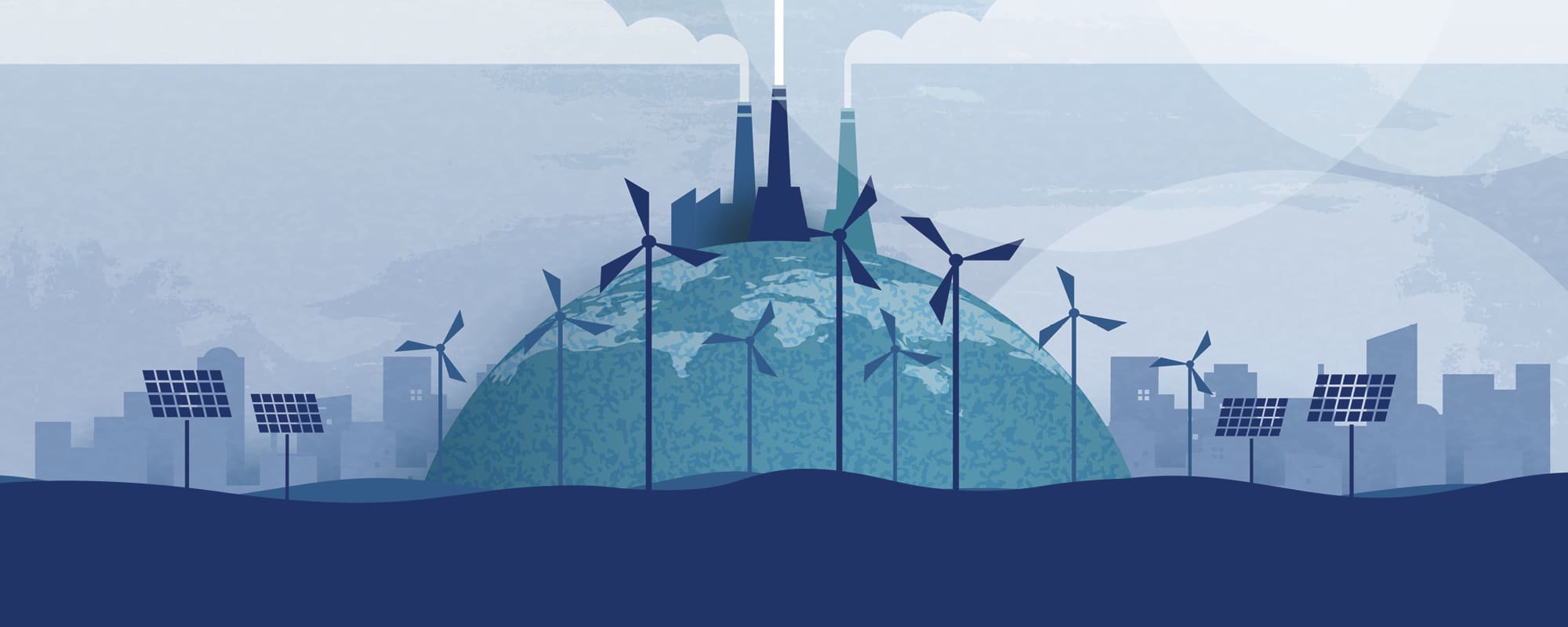Climate change is a growing problem. The longer we go without making sacrifices, the greater the price that must ultimately be paid. The problem is made worse, however, because when it comes to phasing out fossil fuels, some people must automatically pay a higher price than others. So who would the winners and losers be if we suddenly drove forward to significantly lower emissions by 2030, as the European Union intends?
One of the greatest problems with climate change is that everybody seems to think that somebody else should be making bigger sacrifices. The United Nations Framework Convention on Climate Change (UNFCCC) was established in 1994 as a vehicle to tackle climate change, and has been the basis for discussions to lower emissions ever since. The problem is that the benefits of reducing emissions today are spread out among all inhabitants of the planet and are often not immediate, while the costs of reducing emissions are concentrated on the individual or country making the reduction. This creates a situation where each actor has an incentive to free-ride on the efforts of others rather than taking action themselves. How much should one sacrifice for it to be fair?
Before the Paris Climate Accord in 2015, there was the failed Copenhagen Accord. Christiana Figueres, executive secretary of the UNFCCC from 2010 to 2016, said that the Copenhagen Accord in 2009 was a free-for-all of political frustration, outrage, and disagreement, in which the global north and global south were set against each other over the issue of climate justice. The perspective of poorer countries was that richer countries have benefited from industrial revolutions, emitting carbon for over a century, and therefore, they should be paying to help poorer countries to go green instead of just blocking them from using fossil fuels. This notion of climate justice has taken centre stage ever since.
Answering the question of who should be paying the most to address climate change is challenging. However, the need for drastic reform is undeniable. This begs the question: what are the strategies of those preventing climate action from happening?
The Church of Oil
Unsurprisingly, fossil fuel companies stand to lose from the transition to green energy. What is surprising, however, is that fossil fuel companies such as ExxonMobil have been accurately predicting the devastating effects of climate change as early as 1977. In 2021, American Environmental Sociologist Robert Brulle pointed to new evidence that has come to light of the ‘deliberate and organised effort to misdirect the public understanding of this issue through the promotion of uncertainty over mainstream climate science,’ utilising phoney think tanks as weapons to delay action and confuse the science and the public debate around it. Therefore, part of the tension between science and politics, including on the global stage, is manufactured by interest groups to protect their advantage. This is done at the expense of the common good and by rigging the rules of the game against the outcomes most beneficial to the global community as a whole.
Upon discovering the damage they were causing, fossil fuel companies reacted by indulging in unprecedented propaganda operations. The objective has been to transform the consumption of fossil fuels into more than just an economic choice, but also into a culture war. In the United States, aversion to renewables and defence of oil is the result of extensive lobbying by fossil fuel companies over generations. The capture of politicians by moneyed interests has also led to an ideological addiction to fossil fuels. Prof. Jean-Daniel Collomb (Grenoble Alpes University), observes that climate scepticism in the US emerged in part because the challenge which climate change poses significantly damages the soundness of the ideological pro-market position which the American conservative movement has been embracing since the Reagan era. Essentially, the reality of climate change harms capitalist ideology. One of the most popular answers to it, therefore, is to deny that it is even happening or that mankind is influencing it.

One can even imagine that if a technology like nuclear fusion were to become commercially viable in the next few years, fossil fuel companies would hardly welcome it. They would most likely do everything in their power to slow the successful adoption of nuclear fusion in spite of the solutions it could offer to the climate crisis and even to global poverty. Even though fossil fuel companies might slow the roll-out of that new technology, they would also realise that in the long-term, it may be a losing battle. They would likely consolidate their hold over third-world markets, who would initially not have the money to invest in nuclear fusion reactors or infrastructure. Furthermore, developing countries may not have the expertise or skills to immediately adapt the technology. Inequality, therefore, would not go anywhere anytime soon, even despite the promise of limitless energy. Fossil fuel companies promise to invest in renewables today, but in reality, they dedicate very few resources to actually doing so and employ similar strategies to get away with it.
Nation States
Certain countries that are heavily dependent on fossil fuels, such as India and China, are busy making the argument that they should be allowed to do so for the sake of catching up with first world countries. They agree to rolling out renewables, but also argue in favour of having more distant carbon neutrality targets. However, while those countries consume fossil fuels, there are others such as Saudi Arabia, Venezuela, and Russia who are famous for selling them. These countries face an even more daunting challenge. They must not only pay for renewable or nuclear infrastructure, but they must give up a competitive advantage from resources they possess in abundance. Such countries participate in the likes of the Paris Agreement, but unsurprisingly, their actions speak louder than words. Like fossil fuel companies, they face the temptation of maintaining their advantage by watering down international agreements.
While it is hard to sympathise with such governments, especially when elites seem to grow richer on such wealth while the poor remain poor, it is also important to note that fossil fuel producing countries also exist in the first world. While the United States is known for its wealth of fossil fuels, and its politics are reluctant to address climate change as a result, there are also countries such as the United Kingdom and Norway who have vast fossil fuel industries. There, political battles rage as to what extent these resources should be kept in the ground in times of economic hardship. The United Kingdom’s briefly sitting Prime Minister, Liz Truss, received much criticism for proposing that fracking be allowed once again, inciting the ire of environmentalists both outside the Conservative Party and within it.
Norway has an even more complex attitude towards fossil fuels. On one hand, Norway is a major producer of oil and gas, and the industry represents a significant part of its economy. The country’s offshore oil and gas reserves have made it one of the world’s wealthiest nations and a major exporter of fossil fuels. On the other hand, Norway has also been at the forefront of efforts to combat climate change and transition to renewable energy. The country has set ambitious targets to reduce greenhouse gas emissions and increase the share of renewable energy in its energy mix. Norway has also invested heavily in research and development of renewable energy technologies such as wind and hydropower. Additionally, Norway has implemented several policies to reduce its carbon emissions, such as a carbon tax, and has committed to being carbon neutral by 2030. The government has also divested from coal and invested in reforestation and afforestation projects to sequester carbon.
Efforts of Individuals
With everybody pointing fingers at everyone else as to who should shoulder the burden of lowering emissions, political scientist and economist Elinor Ostrom warns that ‘given the severity of the threat, simply waiting for resolution of these issues at a global level without trying out policies at multiple scales because they lack a global scale, is not a reasonable stance’. In other words, we cannot sit pretty and expect these problems to sort themselves out in the highest levels of government. Ostrom studied the Tragedy of the Commons, challenging the notion that when communities govern common and shared resources, they must automatically be governed poorly. By identifying case studies of communities who managed their common resources successfully, she was able to draw lessons as to what informal and formal rules worked best to conserve those resources. This theory falls under the umbrella of the ‘governance of the commons’.
To address climate change, therefore, Ostrom has proposed a polycentric approach – action taken at all levels, from top to bottom. However, one of the clearest take-aways from her studies is that to resolve problems such as the Tragedy of the Commons and the inability to cooperate in regards to shared resources, trust is a fundamental requirement. Without trust, enforcement of rules, and clear communication, communities on whatever level cannot successfully govern shared resources. We should not, therefore, let bad faith actors or ‘free-riders’ such as fossil fuel companies destroy our ability to cooperate with one another or encourage us to give up. There are no easy answers to determine who should be the winners and losers of the green energy transition, but Ostrom shows us how we might at least best organise ourselves in the meanwhile. The starting point must certainly be building the trust which inspires action.

The tragedy of the commons refers to a phenomenon where individuals or groups overuse a shared resource by choosing to act in their own self-interest, instead of moderating their behaviour. This can occur in situations where there is no mechanism in place to regulate usage or ensure preservation of the resource. Climate change is an example of a tragedy of the commons, as the emission of greenhouse gases by individuals, businesses, and governments contributes to the warming of the planet, but there is little incentive for any one actor to reduce emissions without a coordinated global effort. The negative impacts of climate change, such as desertification and more frequent natural disasters, are shared by everyone, but the benefits of reducing emissions are not equally distributed. Therefore, people are not incentivised to shoulder the responsibility of fixing the problem, especially if few people around them are doing so. This creates a situation where the costs of inaction are high, but the incentives for action are weak.
Further Reading
Brulle, R.J., 2021. Networks of Opposition: A Structural Analysis of U.S. Climate Change Countermovement Coalitions 1989–2015. Sociological inquiry, 91(3), pp.603–624.
Collomb, J.-D., 2014. The Ideology of Climate Change Denial in the United States. European journal of American studies, 9(1), European journal of American studies, 2014–04-01, Vol.9 (1).
Figueres, C., 2020. Paris taught me how to do what is necessary to combat climate change. Nature (London), 577(7791), pp.470–471.
Supran, G., Rahmstorf, S. and Oreskes, N. (2023) ‘Assessing ExxonMobil’s global warming projections,’ Science (American Association for the Advancement of Science), 379(6628), p.153.
Ostrom, E., 2014. A polycentric approach for coping with climate change. Annals of economics and finance, 15(1), pp.97–134.






Comments are closed for this article!